Building Stronger Care Routines for Senior Oral Health
April 14, 2025
Image via Freepik
Caring for the oral health of dependent seniors is a vital responsibility that profoundly influences their overall well-being. As a caregiver, understanding the nuances of senior dental care can empower you to make informed decisions that enhance their quality of life. From leveraging digital tools for efficient record-keeping to selecting appropriate oral care products, each step you take can significantly impact their health. Recognizing the connection between oral hygiene and chronic illnesses further underscores the importance of diligent care.
Knowing the Connection Between Oral Health and Illness
Understanding the link between oral health and chronic illnesses in seniors is vital. Poor oral hygiene can worsen conditions like diabetes and heart disease, as bacteria from gum disease may enter the bloodstream, potentially aggravating heart issues. Seniors with diabetes are particularly prone to infections, including those in the mouth, making regular dental care crucial. Maintaining good oral health can help manage blood sugar levels and reduce cardiovascular risks. Therefore, prioritizing oral hygiene is essential for preventing cavities and safeguarding overall health in older adults.
Considering Cognitive Impairments
Caring for seniors with cognitive challenges, such as dementia, requires special attention to their oral health needs. These individuals often face difficulties with daily oral hygiene due to memory loss or diminished motor skills, which can increase their risk of dental problems. Establishing a consistent routine and using visual or verbal cues can assist them with brushing and flossing. Choosing user-friendly dental products, like electric toothbrushes with larger handles, can also empower them to maintain their oral hygiene more independently.
Enhancing Senior Oral Care with Digital Records
Digitizing dental records is vital in supporting dependent seniors’ oral health. By transforming paper documents into digital formats, you can ensure that critical dental histories and treatment plans are always accessible. You can try this mobile scanning app to quickly capture documents with your device’s camera and convert them into PDFs, making the process efficient and reducing the risk of losing critical information. This digital approach simplifies record-keeping and enables easy sharing with healthcare professionals, allowing you to concentrate more on the seniors’ well-being rather than administrative duties.
Getting the Proper Oral Health Products
Selecting the right oral care products is essential to address specific dental needs, such as sensitivity and gum health. Seniors often face increased tooth sensitivity, making regular toothpaste uncomfortable. Opt for toothpaste formulated for sensitive teeth containing ingredients like potassium nitrate to alleviate discomfort. Maintaining gum health is also crucial, as many older adults are prone to periodontal issues. Choosing a mouthwash that supports gum health, particularly those with antibacterial properties, can help prevent gum disease and promote oral well-being.
Prioritizing Hydration for Senior Oral Health
Keeping seniors well-hydrated is crucial for their oral health. Water helps prevent dry mouth, a condition that can increase the risk of cavities due to reduced saliva, which is essential for neutralizing acids and removing food particles. Encouraging seniors to drink enough water supports saliva production, which is vital for protecting teeth and gums. Water is a safe, sugar-free option, unlike sugary drinks that can erode enamel. Therefore, promoting regular water intake is a simple yet effective way to enhance the oral health of dependent seniors.
Understanding Medication’s Impact on Senior Oral Health
It’s essential to understand how medications can impact seniors’ oral health. Many common prescriptions, such as antihistamines and blood pressure medications, can cause dry mouth, which reduces saliva production. Saliva is crucial for neutralizing acids and removing food particles, so its reduction can increase the risk of cavities and gum disease. Additionally, some medications might lead to gum swelling or bleeding, potentially worsening existing dental issues. By staying informed about these side effects and consulting with healthcare professionals, you can help maintain the oral health of your loved ones.
Supporting Seniors with Dental Anxiety
To effectively care for the oral health of dependent seniors, it’s essential to understand the roots of dental anxiety, often linked to past traumatic experiences or fear of pain. Many elderly individuals may have faced distressing dental treatments, which can heighten anxiety about future visits. Recognizing these fears can tailor your approach to provide a more comforting and reassuring experience. Offering gentle, empathetic care can help ease their anxiety and improve their dental health.
Your commitment to understanding and addressing the oral health needs of seniors can lead to profound improvements in their quality of life. By integrating these strategies into your caregiving routine, you not only support their physical health but also contribute to their emotional well-being. The impact of your efforts extends beyond immediate health benefits, fostering a sense of dignity and comfort for the seniors in your care.
Discover a vibrant community where personalized care meets independence at Encore at Avalon Park, and explore how we can enrich the lives of your loved ones today!
